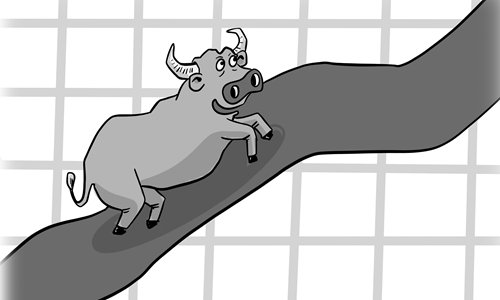HOME >> BUSINESS
No, we do not ‘need’ another painful recession
By J. Bradford DeLong Source:Global Times Published: 2019/10/16 20:33:40

Illustration: Luo Xuan/GT
I recently received an email from my friend Mark Thoma of the University of Oregon, asking if I had noticed an increase in commentaries suggesting that a recession would be a good and healthy purge for the economy (or something along those lines). In fact, I too have noticed more commentators expressing the view that "recessions, painful as they are, are a necessary growth input." I am rather surprised by it.
Of course, it was not uncommon for commentators to argue for a "needed" recession before the big one hit in 2008-2010.
But I for one assumed that this claim was long dead. Who in 2019 could say with a straight face that a recession and high unemployment under conditions of low inflation would be a good thing?
Apparently, I was wrong. The argument turns out to be an example of what Nobel laureate economist Paul Krugman calls a "zombie idea… that should have died long ago in the face of evidence or logic, but just keeps shambling forward, eating peoples' brains." Clearly, those who claim to welcome recessions have never looked at the data. If they did, they would understand that beneficial structural changes to the economy occur during booms, not during busts.
Obviously, shifting workers from a low-marginal-product activity to a zero-marginal-product activity is not progress. Nor is there any theoretical or empirical reason to think that people and resources cannot be pulled directly from low-to high-marginal-product activities during upswings, as if it takes a full washout to create the conditions for such movements.
Those who cheer loudest for recessions usually are not consumers, workers or employers. They are most often financiers. After all, workers themselves are rarely unhappy to be working during booms.
To be sure, in the 1970s, the Nobel laureate economist Robert Lucas speculated that in the aftermath of a boom, workers would actually end up being unhappy for having worked during the good times. Having misperceived the prices of the goods they were buying, he argued, they would discover that they had overestimated their real (inflation-adjusted) wages: they had not been earning as much as they thought they were. But Lucas never explained why workers would have more information about wages than about the prices they were paying for groceries, rent and so forth. Even as an abstract description of some unspecified process, the overall conjecture made very little sense.
By the same token, consumers rarely misperceive the utility of what they purchase. And firms, likewise, are rarely unhappy to have produced during a boom. They, too, have as much information about the prices at which they are buying as the prices at which they are selling. They, too, are subject to what Lucas called "nominal misperceptions." Monopoly and monopsony power can drive a wedge between prices and marginal revenues, and between wages and marginal labor costs. But, generally speaking, firms prefer to hire more workers and make more stuff at whatever the current wage or price. They will seize known opportunities in the present rather than wait around for some unknown future. So, who is really the most blinkered during booms? It is all of those who invested in outright scams like Theranos, or in risky bets like WeWork and Bitcoin. They are the ones who are sorry after the fact, and who wish that the central bank had taken away the punch bowl much earlier. If only they hadn't succumbed to a fit of positive-feedback trading. If only they hadn't been deranged by irrational exuberance, falling for what they heard in the financial-gossip echo chamber. As the 20th century economic historian Charles P. Kindleberger famously joked, "There is nothing as disturbing to one's wellbeing and judgment as to see a friend get rich."
Envy and greed are the muses that always convince some to buy at the peak of a bubble. Only afterwards will these greater fools wonder why there hadn't been more hints of the risks, or reach for some other argument to keep them in their right minds.
Yet even from this perspective, the conviction that a period of liquidation and contraction is needed after a boom remains incomprehensible. Business cycles can end with a rolling readjustment in which asset values are marked back down to reflect underlying fundamentals, or they can end in depression and mass unemployment. There is never any good reason why the second option should prevail.
The author is a former deputy assistant US Treasury secretary, currently professor of Economics at the University of California at Berkeley and a research associate at the National Bureau of Economic Research. Copyright: Project Syndicate, 2019. bizopinion@globaltimes.com.cn
Posted in: INSIDER'S EYE